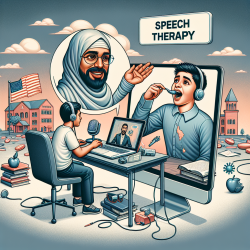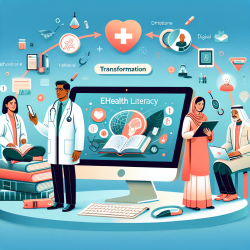Introduction
As a speech-language pathologist deeply committed to data-driven decision-making, I am thrilled to explore how the findings from a systematic review on drug counterfeiting can be applied to improve online therapy services for children. While the original research focused on systems-level interventions to combat drug counterfeiting, the insights gained can inspire practitioners in the field of online therapy to enhance their skills and create better outcomes for children.
Key Insights from the Research
The systematic review, titled "Strategies and Systems-Level Interventions to Combat or Prevent Drug Counterfeiting: A Systematic Review of Evidence Beyond Effectiveness," provides valuable lessons on implementing effective interventions. Here are some key takeaways that can be adapted to online therapy:
- Regulatory Measures: Just as regulatory measures are crucial in combating counterfeit drugs, establishing clear guidelines and standards for online therapy can ensure quality and consistency in service delivery.
- Communication and Feedback: Enhancing communication lines and providing feedback mechanisms can improve the quality of online therapy sessions, much like they help in addressing drug quality issues.
- Public Awareness and Education: Educating stakeholders about the benefits and limitations of online therapy can foster trust and engagement, similar to public awareness campaigns against counterfeit drugs.
- Technological Infrastructure: A robust technological infrastructure is essential for effective online therapy, paralleling the need for strong information systems in drug authentication.
Applying Research Insights to Online Therapy
By integrating these insights into online therapy practices, practitioners can enhance the quality and effectiveness of their services. Here are some actionable steps:
- Develop Comprehensive Guidelines: Create clear protocols for online therapy sessions, including privacy measures, session structure, and outcome tracking.
- Foster Open Communication: Establish regular feedback loops with clients and caregivers to continuously improve therapy outcomes and address concerns promptly.
- Invest in Technology: Ensure that the technological tools used for online therapy are reliable, user-friendly, and secure, facilitating seamless interactions.
- Engage in Continuous Education: Stay informed about the latest research and developments in online therapy to implement evidence-based practices effectively.
Encouraging Further Research
While the current research provides a strong foundation, there is always room for further exploration. Practitioners are encouraged to engage in ongoing research to identify new strategies and technologies that can enhance online therapy for children. Collaborating with researchers and participating in studies can provide valuable insights and contribute to the advancement of the field.
Conclusion
By leveraging the insights from the systematic review on drug counterfeiting, online therapy practitioners can enhance their skills and create better outcomes for children. Implementing evidence-based strategies, fostering communication, and investing in technology are key steps towards achieving this goal. Together, we can empower change and ensure that every child receives the best possible online therapy experience.
To read the original research paper, please follow this link: Strategies and Systems-Level Interventions to Combat or Prevent Drug Counterfeiting: A Systematic Review of Evidence Beyond Effectiveness.










